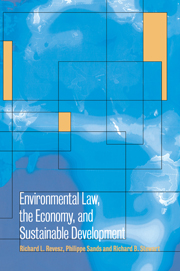 Environmental Law, the Economy and Sustainable Development
Environmental Law, the Economy and Sustainable Development Book contents
- Frontmatter
- Contents
- List of contributors
- Introduction: environmental regulation in multi-jurisdictional regimes
- PART I ENVIRONMENTAL REGULATION IN FEDERAL SYSTEMS
- PART II ENVIRONMENTAL REGULATION AND INTERNATIONAL TRADE
- PART III CHOICE OF ENVIRONMENTAL POLICY INSTRUMENTS
- 7 Economic incentives for environmental protection: opportunities and obstacles
- 8 Market-based incentives for environmental protection
- 9 Equity and efficiency in global emissions markets
- PART IV THE ENVIRONMENTAL STANDARD - SETTING PROCESS
- PART V INTERNATIONAL ENVIRONMENTAL LAW AND SUSTAINABLE DEVELOPMENT
- Index
7 - Economic incentives for environmental protection: opportunities and obstacles
Published online by Cambridge University Press: 03 May 2010
- Frontmatter
- Contents
- List of contributors
- Introduction: environmental regulation in multi-jurisdictional regimes
- PART I ENVIRONMENTAL REGULATION IN FEDERAL SYSTEMS
- PART II ENVIRONMENTAL REGULATION AND INTERNATIONAL TRADE
- PART III CHOICE OF ENVIRONMENTAL POLICY INSTRUMENTS
- 7 Economic incentives for environmental protection: opportunities and obstacles
- 8 Market-based incentives for environmental protection
- 9 Equity and efficiency in global emissions markets
- PART IV THE ENVIRONMENTAL STANDARD - SETTING PROCESS
- PART V INTERNATIONAL ENVIRONMENTAL LAW AND SUSTAINABLE DEVELOPMENT
- Index
Summary
Introduction
The failings of state socialism in the former Soviet Union, Eastern Europe, and many developing countries have stimulated renewed appreciation of the economic and political virtues of competitive markets in harnessing the efforts of managers to the demands of consumers, promoting efficiency in resource allocation, stimulating innovation, and avoiding undue concentration of political economic power. Many nations have taken steps during the past twenty years to dismantle central planning, privatize state-owned enterprises, and reduce or transform government control of economic activity.
Yet, during the same two decades governments have adopted and continually expanded far-reaching centrally planned command-and-control regulatory programs in order to limit air and water pollution, deal with toxic wastes, and solve other environmental problems. Seemingly oblivious to the inherent and well-documented failures of central planning, these programs aim to produce environmental quality by issuing detailed orders to thousands of individual facilities, prescribing their conduct in labyrinthine detail. This chapter seeks to help resolve this paradox by analyzing the advantages of economic incentive systems (EIS) for environmental protection including environmental taxes and tradable pollution quotas, identifying the types of environmental problems for which they are best suited, diagnosing structural factors that impede wider use of such instruments, and proposing regulatory reform strategies to promote such use.
The traditional instrument of choice for all types of economic and social regulation has been command and control.
- Type
- Chapter
- Information
- Environmental Law, the Economy and Sustainable DevelopmentThe United States, the European Union and the International Community, pp. 171 - 244Publisher: Cambridge University PressPrint publication year: 2000
- 8
- Cited by
